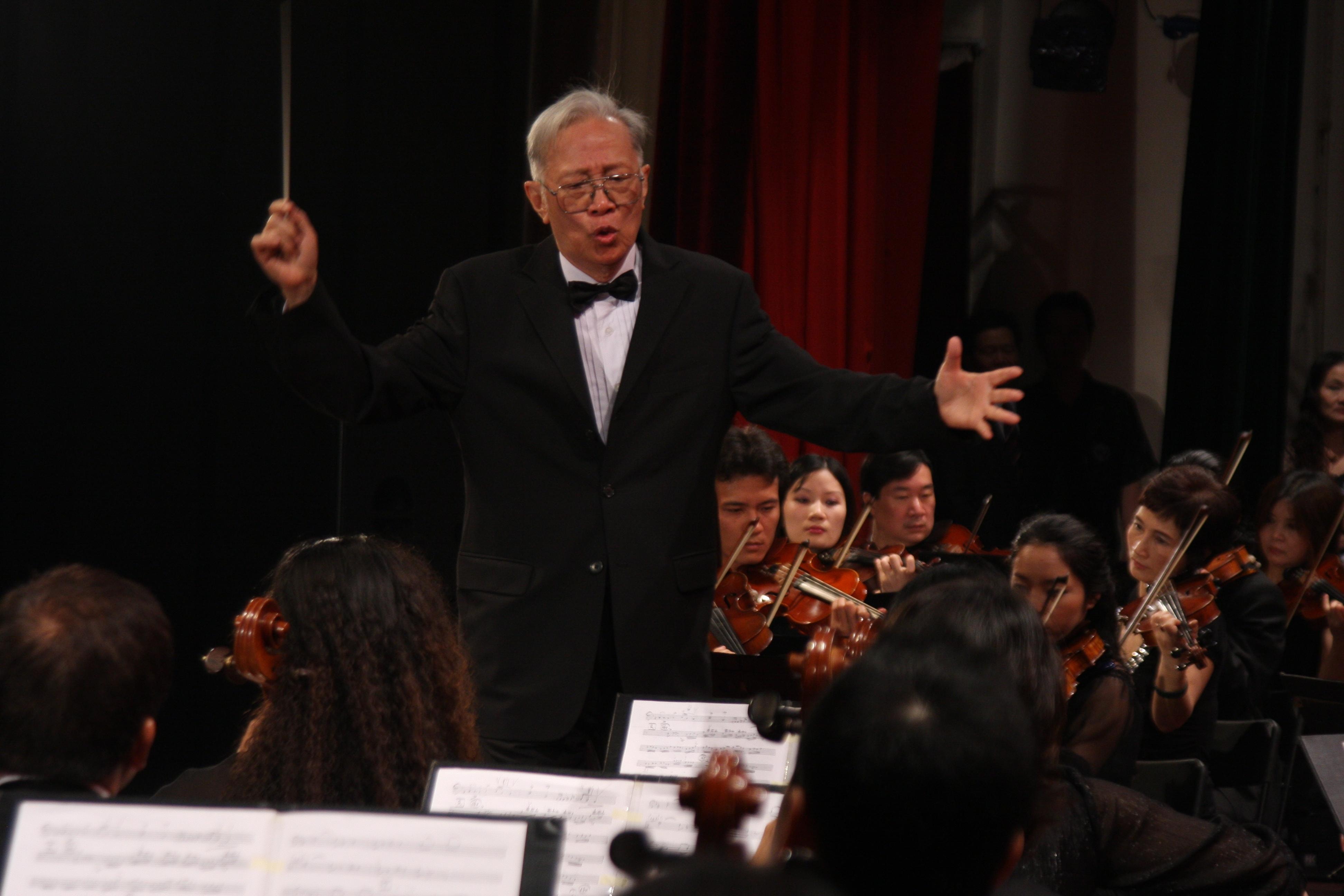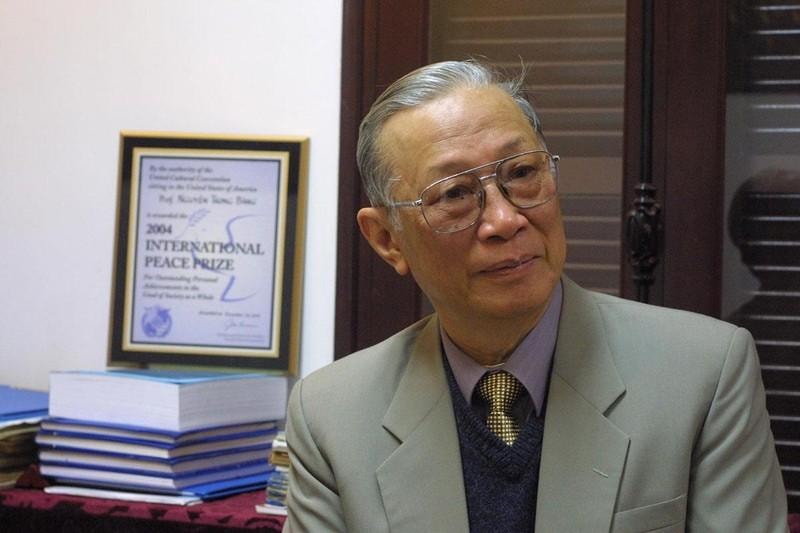Musician, People's Artist Trong Bang and the vibrant days in Nghe An
(Baonghean.vn)- Musician, People's Artist Trong Bang - author of typical songs about homeland and country, the first conductor to conduct famous symphony concerts in Ho Chi Minh City after 1975, passed away on the morning of November 21 at his home in Hanoi, at the age of 91.
 |
Musician, People's Artist Trong Bang. Photo: Nguyen Dinh Toan |
People's Artist Trong Bang was born on May 1, 1931 in Cao Bang, his hometown is Gia Lam, Hanoi. He was born into a family of patriotic intellectuals. His father, Nguyen Trong Phong, was born in 1895. Before the August Revolution, he worked as an architect, designer, and contractor in the construction and road sectors. He was an employee of the Nghe An Department of Public Works (ie the Central Region Department of Agriculture, directed by Prince Xu Pha Nu Vong, during the French colonial period). After the August Revolution, he was an officer of the Kien An Province Department of Architecture (now Kien An District, Hai Phong City). His mother, Nguyen Thi Tre, was born in 1899, a housewife, wholeheartedly raising her children to become talented. His brother was Nguyen Trong Loan, former Head of the Cultural Troupe of the General Political Department of the Vietnam People's Army; former Deputy Director of the Army Theater.
Because his father was a road worker and had to work at many construction sites in the country, musician Trong Bang followed his father and family to all the countryside from the North to the Central of Vietnam from a young age. When his father built the Cao Bang bridge, he named his son Trong Bang to commemorate his birthplace. In the 1940s, his father was mobilized by the French protectorate to Nghe An to complete the construction of the Ba Ra Do Luong Dam system under the authority of the Director of the Central Agriculture Department, Prince Xu Pha Nu Vong.
In his youth, he was immersed in many beautiful landscapes of the country, and his father often played folk songs imbued with national love for him, so from a very young age, he and his older brother Trong Loan had musical talent and aptitude.
 |
Musician Trong Bang's father once worked on the construction of the Do Luong culvert. This was also the time when the musician had strong ties to his hometown Nghe An and the poetic Lam River. |
The late musician Trong Loan told a story about when he was in Vinh, living in the Thau Dau area, near Vinh National School, early one Sunday morning, the two brothers sat hugging their guitars and passionately playing a Japanese folk song. By chance, a group of Japanese soldiers were marching in unison on the street, passing in front of Mr. Phong's (father's) house. Suddenly, they heard the folk music of their homeland, which made the commanding officer quiet down and order the troops to stand still to listen to the whole song. From then on, every day off, the Japanese officer would come to Mr. Phong's family to ask to listen to the music of the two Nguyen Trong brothers.
Fortunately, thanks to that, revolutionary documents and the red flag with yellow star were safely hidden here until the day of the General Uprising to seize power in Vinh City. Both brothers Trong Loan and Trong Bang were members of the National Salvation Association of the Phan Dinh Phung Vinh National Salvation Youth Volunteer Team (Team Leader was Tran Xuan, former Captain of the Yellow Shirt Football Team - the predecessor of the current Song Lam Football Team). Trong Loan composed the Phan Dinh Phung National Salvation Youth Volunteer Song and sang this song with his teammates on the streets to effectively encourage the patriotic spirit of fighting the French during the exciting days of the August Revolution of the people of Vinh City and the whole country.
People's Artist Trong Bang lived through a vibrant student life during the resistance war against the French at Vinh National School (now Huynh Thuc Khang School, at that time the school was evacuated to Bach Ngoc commune, Do Luong district). In his free time, he and his classmates would go to the beautiful Lam riverbank to play guitars and sing revolutionary songs. He was appointed as the captain of the school's student art troupes and soon composed songs for the locality...
After graduating from the first course of the University of Literature, he was sent to work in the Central Laos Front and then to Viet Bac as the Captain of the Central People's Art Troupe (now the Vietnam Music and Dance Theater). He was the first Vietnamese to graduate with a Red Diploma from the Moscow Tchaikovsky Conservatory (former Soviet Union in 1963). In 1969, he was sent to study at the Moscow Tchaikovsky Conservatory. Returning to Vietnam, he worked as a lecturer at the Vietnam Music School and as the Conductor of the Vietnam Symphony Orchestra - Choir - Opera and Ballet, and was later appointed as Deputy Director and Artistic Director (1975). From 1978 to 1984, he was Deputy Director of the Hanoi Conservatory, and Director of the Symphony Orchestra, which he was authorized to establish by the Ministry of Culture. From 1984 to 1996, he was Director of the Hanoi Conservatory of Music, making an important contribution to making the Conservatory a prestigious training, research and performance center domestically and internationally.
People's Artist Trong Bang has made many contributions to the cause of building and developing classical music in Vietnam. He was the first conductor to conduct famous symphony concerts in Saigon right after the complete liberation of the South (1975). He conducted the Moscow and Tasken symphony orchestras during the Vietnam Cultural Days in the former Soviet Union in 1985. He conducted the Japanese Electone Orchestra - Tokyo in the summer of 1995. The artist has conducted the Hanoi Symphony Orchestra with the participation of many famous artists from France, Switzerland, Japan, Germany, the United States, Australia... to Vietnam.
 |
Musician Trong Bang. Photo: Nguyen Dinh Toan. |
NS's famous works are instrumental pieces that have a solid position in the history of young Vietnamese instrumental music (choral symphonies), such as: Dance for Cello and Piano, OververtureWelcome(1986); Symphony of PoetryThe person who returns brings joy(1990); Overture FantáiieWelcome to the new millennium(2000) andNorthwest epic… The instrumental compositions of musician Trong Bang have been printed, recorded and performed in many places at home and abroad.
NS also composed many famous songs, typically: Song CollectionLove of homeland(H., Culture, 1976); AnthologySong of the Gunman(2000). NS's famous songs such as:The Northwest is bright again(1951),Love of homeland(1954),Drilling machine speed(1961),The warriors of Nui Thanh(1965), The American empire is the body of a fly(1965), Song by the pontoon bridge(1966), The storm is coming(1968), We are police officers, The whole country turns to Hanoi, The homeland resounds with proud songs, Forever echoes the love song, Ba Na airplane, We sing about Saigon, See you next year, Cua Lo, With the city of my childhood(to Vinh city)…
NS is also the music author of many stage plays, such as:The Storm at Sea, The Tragic Third, The Gunman, The Russians, Citizen Number One, Last Night in Spain, Till We Return;of many movies:Cu Chinh Lan, Sea of Fire, Cluster of Morning Glory, Saint's Day, The Unbuilt Wall, Star of the Sea, Punishment, Hoang Hoa Tham,and many other documentaries and news...
NS has always adhered to the reality of production and combat topics to compose. His compositions demonstrate musical talent and versatility in style. His instrumental pieces are very heroic, both classical and breath-taking and of the grandeur of the times. IfNorthwest epicexpressing a bright and cheerful atmosphere, imbued with the folk music of the northern mountainous region;Love of Homelandlyrical, thenThe American empire is the body of a flyhumorous and satirical; ifSong by the pontoon bridgeis profound, penetrating the heart, thenThe warriors of Thanh mountainHis compositions were well received by the people with their passionate, solemn, lyrical tones, both scholarly and imbued with national identity, so they deserved to receive many awards for vocal and instrumental compositions from the State, localities, and social organizations.
NS was invited to attend international conferences and seminars on music in Belgium, Germany, Japan, Thailand... Participated as a judge in international music councils, such as: Member of the Graduation Examination Council of the Academy of Performing Arts in Hong Kong (APA); Instrumental Composition Examination Council of the Asian Musicians Association (ACL); and was also invited to act in filmsDien Bien Phuof France as conductor (1991).
The domestic and foreign press have written many times about the artistic life of People's Artist Trong Bang with respect and admiration for a musician who is truly prestigious at home and abroad. He is an all-round musician, composing vocal, instrumental, and theoretical music, and is also an experienced pedagogue; an excellent orchestra conductor and has made many great contributions to the improvement and development of Vietnamese traditional scholarly and professional music.
With his great contributions to Vietnamese music, People's Artist Trong Bang was awarded the Third Class Independence Medal in 2013 and the Ho Chi Minh Prize for Literature and Arts in 2017 for his works: Poetic SymphonyThe person who returned brought joy, the epic poem of the Northwest - Dien Bien Phu, adapted musicHello new millennium,soundtrackCu Chinh Lan - The young soldierand songs:The storm is rising, The rhythm of the drilling machine, We are police officers, The love song echoes forever...
Although People's Artist Trong Bang has passed away, his aspirations and wishes for an advanced Vietnamese music with strong national identity will be preserved and continued by his students' generation until the future./.


